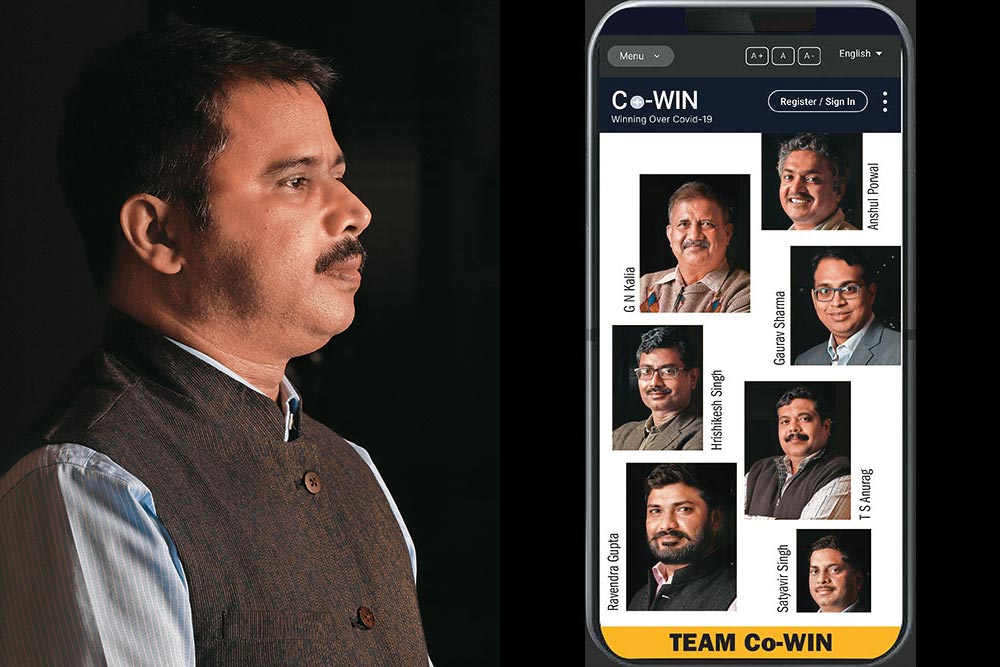October this year, India hit the 100-crore COVID-19 vaccine milestone. The credit for the feat, to a great extent, goes to the CoWIN app. The platform was launched on January 16, 2021 by the Modi government for the vaccination process and real-time monitoring of vaccine delivery. In time, the app emerged as the digital backbone of India’s COVID vaccination drive and connected stakeholders at various levels of India’s health system, including vaccine manufacturers, administrators and verifiers, public and private vaccination facilities, and vaccine recipients.
What went behind creating such a critical app in record time is a story worth being told.
In October 2020, about 25 people from across the country had come together virtually to design something important amidst the pandemic mayhem. They were assigned to create the COVID Vaccine Intelligence Network or CoWIN for efficient implementation and monitoring of the world’s biggest vaccination drive. And, they had three months to do so.
Interestingly, none of the team members met each other physically because of the COVID situation and remained in touch through video conferencing. So, a software developer sitting in the southern part of India worked in tandem with those in the northern, eastern or western parts of the country.
“While the launch date came closer, we held our nerve and worked tirelessly. From January 13 to 16, till the app was successfully launched, we hardly slept. Even our meals were in front of the camera because we had to ensure that the app was working seamlessly,” says Debabrata Nayak who led the technical team of the project.
For scaling the project, CoWIN was integrated with other government mobile applications such as Aarogya Setu, a digital solution designed by the Centre for contact tracing that identifies hotspots and assists in curbing the spread of the virus and UMANG, a platform that allows Indian citizens to access multiple government services.
“Additionally, with the rollout of the vaccination programme in different phases, we kept working on the platform to make it scalable. At the beginning of each of these phases, CoWIN’s developers adjusted the platform to accommodate an influx of new users,” says Nayak.
For instance, in Phase I, the entire registration process was online because healthcare workers had reliable access to the digital infrastructure they needed to use. In the subsequent phases, the platform incorporated provisions for both online and on-site registrations (typically via physical registration centers known as Common Services Centres or through vaccination centers) to ensure inclusion of all citizens, especially those from remote areas and/or without access to digital tools. Provisions were also made for people to walk into vaccination centres, where workers registered such citizens on the platform.
Registered users now received automated text messages on their mobile numbers regarding vaccination appointments, second dose reminders, and links to digital vaccination certificates.
“We had to ensure that the app was easy to use and later, that also became its USP. With minimal data, a citizen is able to register and get vaccinated in the place of his/her choice—either hospitals or other locations. CoWIN has given users the freedom to choose the vaccine they like from the hospital where it is available. Users are, therefore, not restricted within their district or even state to get their shots—they can get vaccinated anywhere in India,” he says.
By digitising all the vaccine delivery-related workflow at each touchpoint, the platform enabled greater vaccine coverage and a systematic rollout of the programme.
“CoWIN not only made it easier for people to get vaccinated as per their convenience but also served as a proof of concept on how holistic digital assets can be created, seamlessly integrated, and an interoperable ecosystem can be made to move towards the broader vision of Ayushman Bharat Digital Mission,” says Nayak.
Optimistic about CoWIN being used as a universal vaccination platform, Nayak says, “Given the functionalities enshrined within the platform and its proven results to sustain a large volume of data/transactions, CoWIN can certainly enhance various public health programmes.”











